
The Marshall Library of Economics is a library of the University of Cambridge, England.

The Marshall Library of Economics is a library of the University of Cambridge, England.
The library is the outgrowth of a Moral Sciences Library begun in 1885 by Professor Alfred Marshall and Professor Henry Sidgwick, consisting largely of their own books and housed in the Selwyn Divinity School, opposite St John's College. Since 2012 the library has also held books of the Centre of Development Studies, which had been housed in the Mill Lane Library.
Upon his death in 1924, Professor Marshall bequeathed much of his personal library to Cambridge. In his honour, the expanded collection was named "The Marshall Library of Economics", and moved to larger quarters in the former Balfour Laboratory in Downing Place. In 1935, it took over the former Squire Law Library, adjoining the Geological Museum, and in the early 1960s relocated once again to its present home on the Sidgwick Site. The Marshall Library is housed within the Austin Robinson Building (which is home to the Faculty of Economics), designed by Hugh Casson.
The library covers Economics, Applied Economics, and Development Studies. The collection consists of approximately 75,000 monographs, 25,000 volumes of periodicals and serials, 30 current periodical titles (print). [1] The historic collection includes about 4,000 rare books, and various archival materials of economists (e.g. John Neville Keynes, Arthur Pigou, Austin Robinson).

Alfred Marshall was an English economist, and was one of the most influential economists of his time. His book Principles of Economics (1890) was the dominant economic textbook in England for many years. It brought the ideas of supply and demand, marginal utility, and costs of production into a coherent whole. He is known as one of the founders of neoclassical economics.

Henry Sidgwick was an English utilitarian philosopher and economist and is best known in philosophy for his utilitarian treatise The Methods of Ethics. His work in economics has also had a lasting influence. He was the Knightbridge Professor of Moral Philosophy at the University of Cambridge from 1883 until his death. He was one of the founders and first president of the Society for Psychical Research and a member of the Metaphysical Society and promoted the higher education of women. In 1875, with Millicent Garrett Fawcett, he co-founded Newnham College, a women-only constituent college of the University of Cambridge. It was the second Cambridge college to admit women, after Girton College. In 1856, Sidgwick joined the Cambridge Apostles intellectual secret society.
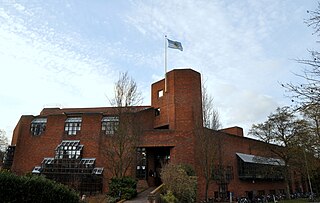
Robinson College is a constituent college of the University of Cambridge. Founded in 1977, it is one of the newest Oxbridge colleges and is unique in having been intended, from its inception, for both undergraduate and graduate students of both sexes.

Cambridge University Library is the main research library of the University of Cambridge. It is the largest of over 100 libraries within the university. The library is a major scholarly resource for members of the University of Cambridge and external researchers. It is often referred to within the university as the UL. Thirty-three faculty and departmental libraries are associated with the University Library for the purpose of central governance and administration, forming "Cambridge University Libraries".

The Hoover Institution is an American public policy think tank which promotes personal and economic liberty, free enterprise, and limited government. While the institution is formally a unit of Stanford University, it maintains an independent board of overseers and relies on its own income and donations. It is widely described as conservative, although its directors have contested the idea that it is partisan.
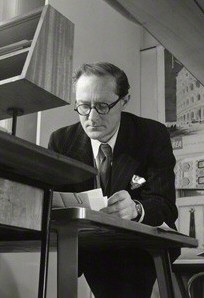
Sir Hugh Maxwell Casson was a British architect, also active as an interior designer, an artist, and a writer and broadcaster on twentieth-century design. He was the director of architecture for the 1951 Festival of Britain. From 1976 to 1984, he was president of the Royal Academy.

Joan Violet Robinson was a British economist known for her wide-ranging contributions to economic theory. One of the most prominent economists of the century, Robinson incarnated the "Cambridge School" in most of its guises in the 20th century. She started out as a Marshallian, became one of the earliest and most ardent Keynesians after 1936, and ended up as a leader of the neo-Ricardian and post-Keynesian schools.

The Pepys Library of Magdalene College, Cambridge, is the personal library collected by Samuel Pepys which he bequeathed to the college following his death in 1703.

The UCL School of Slavonic and East European Studies is a school of University College London (UCL) specializing in Central, Eastern and South-Eastern Europe, Russia and Eurasia. It teaches a range of subjects, including the history, politics, literature, sociology, economics and languages of the region. It is Britain's largest centre for study of Central, Eastern and South-Eastern Europe and Russia. It has links with universities across Europe and beyond. It became part of UCL in 1999.

The Faculty of Law, Cambridge is the law school of the University of Cambridge.

Mary Marshall was an economist who in 1874 had been one of the first women to take the Tripos examination at Cambridge University – although, as a woman, she had been excluded from receiving a degree. She was one of a group of five women who were the first to be admitted to study at Newnham College, the second women's college to be founded at the University.
The Economic Journal is a peer-reviewed academic journal of economics published on behalf of the Royal Economic Society by Oxford University Press. The journal was established in 1891 and publishes papers from all areas of economics.The editor-in-chief is Francesco Lippi.
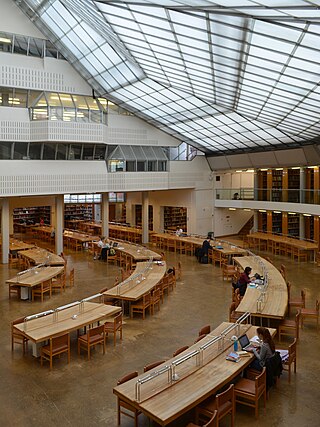
The Seeley Historical Library was originally established as the history library of the University of Cambridge, England. It now holds collections for history, land economy, Latin American studies, politics and international studies and sociology. It is housed within the History Faculty building on the Sidgwick Site off West Road, Cambridge. Since October 2003, incoming books have been classified according to the Library of Congress scheme; before that a unique system was used.

The University of Cambridge was the birthplace of the 'Analytic' School of Philosophy in the early 20th century. The department is located in the Raised Faculty Building on the Sidgwick Site and is part of the Cambridge School of Arts and Humanities. The Faculty achieved the best possible results from The Times 2004 and the QAA Subject Review 2001 (24/24). In the UK as of 2020, it is ranked second by the Guardian, second by the Philosophical Gourmet Report, and fifth by the QS World University Rankings.
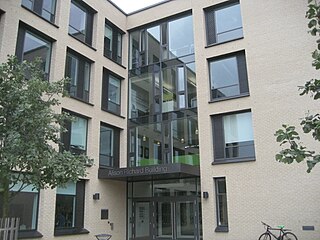
The Faculty of Human, Social, and Political Science at the University of Cambridge was created in 2011 out of a merger of the Faculty of Archaeology and Anthropology and the Faculty of Politics, Psychology, Sociology and International Studies. According to the Cambridge HSPS website: graduates pursue careers in "research, the Civil Service, journalism, management consultancy, museums, conservation and heritage management, national and international NGOs and development agencies, the Law, teaching, publishing, health management, and public relations."
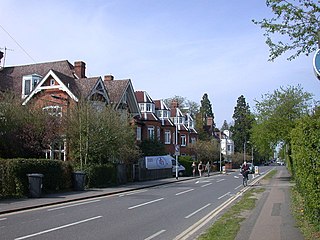
Grange Road is a street in Cambridge, England. It stretches north–south, meeting Madingley Road (A1303) at a T-junction to the north and Barton Road (A603) to the south. It runs approximately parallel with the River Cam to the east. Grange Road is almost one mile long and has 17th-century origins. It contains several colleges of the University of Cambridge.

Sidgwick Avenue is a road located in western Cambridge, England. The avenue runs east-west and links Grange Road to the west with Queen's Road to the east. The line of the road continues northeast into central Cambridge as Silver Street. Sidgwick Avenue is flanked by Newnham College, Ridley Hall, Selwyn College and the Sidgwick Site of the University of Cambridge.

Jesus College is a constituent college of the University of Cambridge. The college's full name is The College of the Blessed Virgin Mary, Saint John the Evangelist and the glorious Virgin Saint Radegund, near Cambridge. Its common name comes from the name of its chapel, Jesus Chapel.
The Casimir Lewy Library is the library of the Faculty of Philosophy at the University of Cambridge. The library is located in the Raised Faculty building on the Sidgwick Site, Sidgwick Avenue, Cambridge. It is open to all members of the university.
The Faculty of Economics is one of the constituent departments of the University of Cambridge. It is composed of five research groups, in macroeconomics, microeconomic theory, economic history, econometrics, and empirical microeconomics. It is located in the Sidgwick Site in Cambridge, has been host to many distinguished economists, and is regarded as the birthplace of macroeconomics. 19 students or members of the faculty have won the Nobel Memorial Prize in Economic Sciences.
52°12′03″N0°06′32″E / 52.200789°N 0.108985°E